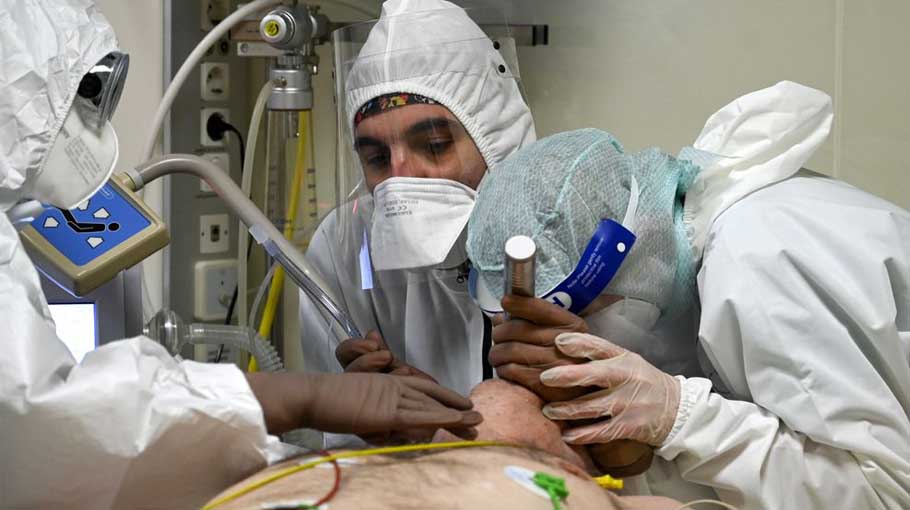Europe is experiencing two very different pandemics

A year ago, the course of the pandemic changed, thanks to the first safe and effective vaccines against Covid-19. Today, after administering 7.3 billion doses and preventing countless deaths, we have more data than ever to justify that early enthusiasm — and the need to keep jabbing.
On top of waning immunity and the lifting of restrictions, countries with persistently low vaccination rates are being hit hard by new waves of the virus. As the delta variant rears its ugly head across Europe once more, the continent is experiencing two very different pandemics. Both will need action.
For much of the rich world, vaccine supply issues are a distant memory. Waning immunity is the bigger threat, and highly-inoculated countries like Spain or Denmark — where nearly 100% of over-60s have been fully vaccinated — are focused on zapping complacency with booster shots. Even controversial measures like health passes and mandatory shots for medical staff have paid off and lifted take-up despite protests. On Tuesday, French President Emmanuel Macron said France’s Covid pass would require third doses for the elderly.
Read more: COP26 draft vents alarm
These countries have some of the world’s highest vaccination rates, and, as Lone Simonsen, a professor at Roskilde University, puts it, they have the “luxury” of making minor adjustments, such as bringing back mask-wearing, to avoid a return to the full-scale lockdowns of 2020.
Almost two months after European Commission President Ursula von
der Leyen called divergent vaccination rates “worrisome,” policy
makers need to refocus on the huge gap opening up with eastern Europe
Look further East, though, and there are signs of a “pandemic of the unvaccinated,” to borrow a U.S. term. Vaccination rates in eastern European countries are far, far lower — often fatally so. Bulgaria and Romania, together home to around 26 million people, have fully vaccinated only 22.6% and 33.7% of their respective populations, according to Bloomberg data, with coverage for the elderly just as bad. That’s below the European Union average of 67.4% and worse than the least-vaccinated U.S. states.
It’s no coincidence these two countries are posting record daily Covid deaths of more than 20 per million people; Romania’s death rate is among the world’s highest. Latvia — whose vaccination coverage is at 55.6% — is not far behind; it’s gone into lockdown to control its outbreak. France and Germany are at a fraction of those levels. Even as cases hit a record high in Germany, deaths have remained relatively low.
Compare Denmark and Bulgaria, which have broadly similar populations, and it’s clear the delta variant has taken a heavier toll on the latter. Both countries are reporting daily cases in the single-digit-thousands, but hospitalized patients in Bulgaria number around 4,000, versus a few hundred in Denmark. Unsurprisingly, Denmark’s death rate is a fraction of Bulgaria’s, and the same is true of excess all-cause mortality.
Again, supply isn’t the issue here. Europe is swimming in jabs, and data firm Airfinity estimates the region’s 2021 oversupply of unused doses at 282 million doses.
The challenge for these countries is vaccine hesitancy — driven by conspiracy theories, fear of side-effects and low trust in authorities. A survey of unvaccinated people in eight European countries between April and July found hesitancy ran from 5.5% of the adult population in Spain to 50.9% in Bulgaria.
In Romania, where religious figures and social-media influencers have encouraged vaccine refusal, the government has offered unwanted doses to other countries. “Fake news has a huge influence,” a Romanian colonel told the New York Times. There is no magic wand to fix the widespread distrust and suspicion of authority in post-Communist societies, but positive peer pressure can work better than fear. Encouraging vaccinations could be more effective coming from one’s social network and the medical community.
Western Europe shouldn’t underestimate its own challenges as cities get busy, international travel picks up and mask wearing drops. Countries with intermediate vaccine coverage can’t afford to let cases run high. Letting infection rates soar could saturate hospitals, as multiple Covid waves have already led to a shortage of trained staff, according to Daniel Lopez Acuna of the Andalusian School of Public Health. In France, Macron has already pledged to invest in hospitals and hire more staff for better pay.
Almost two months after European Commission President Ursula von der Leyen called divergent vaccination rates “worrisome,” policy makers need to refocus on the huge gap opening up with eastern Europe. It’s chilling to imagine that, a year after vaccines arrived, one of the most potent factors encouraging people to get in line for shots will be rising death tolls in their neighborhoods. This fight is not over.
Lionel Laurent is a Bloomberg Opinion columnist covering the European Union and France. He worked previously at Reuters and Forbes.
Source: Bloomberg



